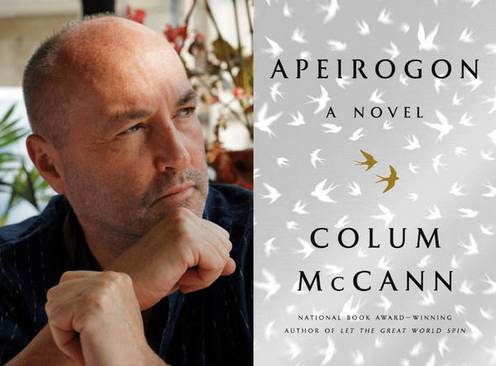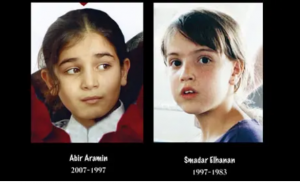The Middle East, A Love Story: Apeirogon Unties the Knot of Israel/Palestine
Colum McCann’s new book about the resiliency of Israelis and Palestinians makes the Middle East a humanist escape for a world in lockdown.

Lisa Van Dusen
April 15, 2020
It seems only natural that Apeirogon, the new novel by Colum McCann about Israel/Palestine, is written by a man from a place that’s also beautiful but burdened by the painful baggage of history. So, no surprise that within its first 20 pages, the emotional impact of Apeirogon recalls the Irish cliché about waiting five minutes if you don’t like the weather.
Because of the narrative structure of Apeirogon, you might sob and laugh within 100 words as you veer from a harrowing description of a suicide bombing on a busy Jerusalem street to the finer, screwball points of François Mitterrand’s last meal on Earth. In a book of infinite layers, call-backs and motifs, even the rollercoaster of reading it echoes the reality of life in the region.
The true story of two men — Bassam Aramin, a Palestinian, and Rami Elhanan, an Israeli — is the core of the book, the aeorta that connects all the other intersecting veins and capillaries in 1,001 chapters of free association that really isn’t free at all. The structure explains the title, an apeirogon being a polygon with an infinite number of sides. The number of chapters, some of which are no more than a sentence or a photo, is an homage to The One Thousand and One Nights. The novel is a novel because it fictionalizes the story, with the protagonists’ blessings, by dramatizing the truth without altering the fundamentals.
The real-life tale of Aramin and Elhanan is a love story not in the romantic sense but because they’re supposed to hate each other, a fact that imbues their tragedy-forged friendship with its own sort of romance. They first met in 2005 at a peace gathering, after Aramin had done seven years in an Israeli prison for flinging a dud grenade as a 17-year-old in the first Intifada and Elhanan was channeling his grief over the 1997 murder of his daughter, Smadar, by a suicide bomber into — among other spaces — an Israeli-Palestinian parents support group. When Aramin’s daughter Abir was also killed, shot outside her school by an IDF soldier in 2007, their bond was sealed by mutual loss, Aramin joined the group, the Parents Circle Families Forum, and they became co-activists.

When any insane system — of life as a mortal maze of random obstacles and arbitrary punishments; of weaponized anger and rewarded murder; of granular, tactical competition perpetuating nothing but loss — is superimposed over human beings, they will unearth sanity like divining rods. These two grieving fathers found sanity in the subversive act of connection. “We are not allowed to talk to them,” Bassam tells audiences about the physical and social barriers between Israelis and Palestinians. “We have no clue what the other is like. That’s where the madness lies.”
Apeirogon is like a series of postcards to a ludicrously complicated paramour, cataloguing by anecdote both sides’ capacity for ingenuity, beauty, irony, resilience and joy despite circumstances seemingly designed to rob them of all of the above. Why do so many Palestinian political prisoners emerge from Israeli prisons having learned Hebrew and embraced civil disobedience? It’s not the beatings. It’s the certainty revealed by years of intimate coexistence that the jailers are as damaged by the occupation as the prisoners, and that more hatred won’t help.

Bassam Aramin (left) and Rami Elhanan (right) — Eyevine
By chronicling the truth of both sides — itself an exercise in Gandhian satyagraha, the form of civil disobedience referenced in the book that uses truth as a force for good — into a mosaic, McCann builds a record to stand against all the propaganda and political posturing that has misrepresented the situation as both normal and hopeless, and the people who endure it as inevitable casualties of history.
Twenty years ago, the Middle East peace process still held promise as a model for overcoming intractability. As with so many instances of all the wrong things being scaled up by a new kind of domination racket — lying, corruption, political thuggery, the commodified misrepresentation of reality — and at a moment when governments are using a global health crisis to double down on covert, surveillance-enabled power, Apeirogon also serves as a cautionary tale. This conflict has become a model for how surveillance states can lock down asymmetrical, inhumane power dynamics to entrench an unjust status quo.
Colum McCann, with a love story of his own, has untied the narrative knot, torn down the wall and proven that the lives transformed by this systemic lunacy share 1,001 things, among them the indomitable impulse to resist.
Lisa Van Dusen is associate editor of Policy Magazine and a columnist for The Hill Times. She was Washington bureau chief for Sun Media, international writer for Peter Jennings at ABC News, and an editor at AP in New York and UPI in Washington. She was also communications director for the McGill Middle East Program in Civil Society and Peace Building (now ICAN).
